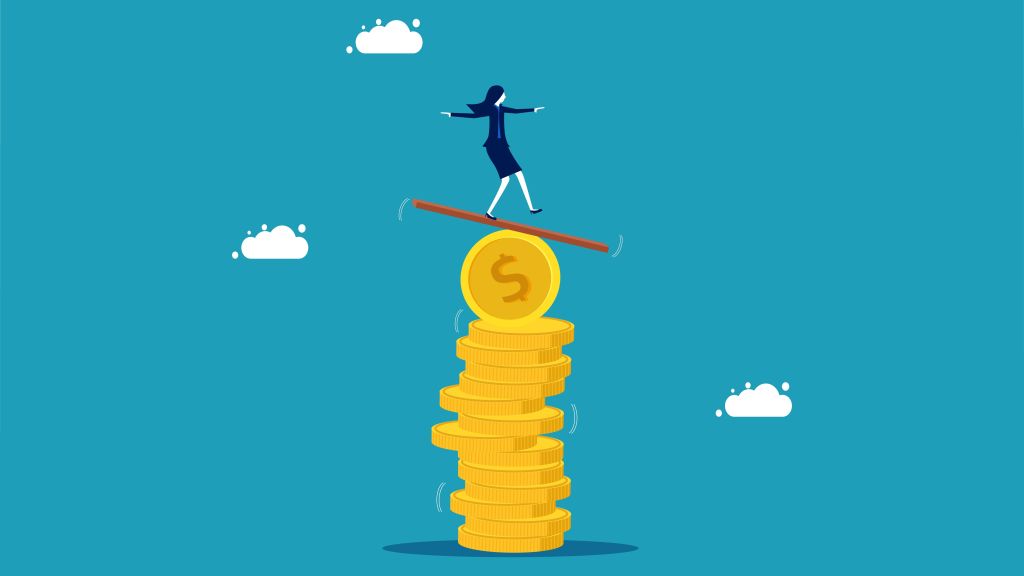Published November 14, 2022 • 7 Min Read
Remember when your dollar bought you so much more at the grocery store? Or when you could finance a new car with interest-free payments? Or when renting a home was a more affordable option than buying one?
Today’s economic conditions – with soaring inflation and high interest rates – are certainly infusing our days with uncertainty, anxiety and seemingly never-ending decision-making moments.
Even if you’re typically quite decisive, you might be doubting your decisions these days. Simple choices can now feel difficult. And more complex decisions, like what to do with your investment portfolio, may leave you plagued with even more uncertainty.
This current struggle to make smart choices is not just happening because there are so many unknowns. The challenge also comes from the way our brains process decisions, says Cendri Hutcherson, director of the Decision Neuroscience Lab and an Assistant Professor of Psychology at the University of Toronto, with a cross-appointment in the Department of Marketing at the Rotman School of Management.
There are two modes people use to make decisions, she explains, and each uses different circuits in the brain. The first mode, used for familiar scenarios, is more automatic and habitual, and it relies on what you’ve learned from experience to be useful. The second mode, for new circumstances, is more flexible and draws on what’s worked for you before, even if it’s not relevant to the current situation.
“With that second, more flexible mode, the neurons operate differently and seem to be particularly vulnerable to stress,” says Hutcherson, who is also the Canada Research Chair in Decision Neuroscience.
In other words, any stress you might be experiencing from being in unfamiliar territory – such as facing a potential recession, for example – may be undermining your brain’s ability to make good decisions.
Of course, that doesn’t mean you should throw your hands up in the air or resort to coin-flipping. Hutcherson suggests the following tips to help you improve the quality of your decision-making while under pressure.
Take your time
Your parents were right when they told you to sleep on it. People generally make better choices when they consider all the factors that apply, which is difficult to do if you’re in a rush.
Unfortunately, we’re evolutionarily hardwired to make quick assessments during times of stress, says Hutcherson. “Out in the savanna, stress came from encountering a predator like a lion or snake, and you’d be eaten if you took the time to evaluate all your options,” she says. Obviously, that response is less adaptive in a modern setting, so try to slow down and weigh all the alternatives.
A good strategy in some situations can be to stop what you’re doing, pull out your calendar, and schedule an “appointment” the following day to finalize your decision. Then, before your deadline, engage in some mindless activities – say, taking a walk or doing chores – to give yourself lots of contemplation time. Investing can sometimes require quick thinking, but even a pause may help you avoid rash decisions that aren’t aligned with your overall plan.
Maximize your mornings
Effective decision-making requires considerable effort. As a day wears on and you make a series of choices, be they mundane (e.g., what to wear) or challenging (e.g., which daycare fits your needs and budget), your brain can lose its decision-making mojo.
“The brain just wants a break and doesn’t want to put in all that effort anymore,” says Hutcherson. “That can lead us to make decisions without considering all the factors.”
By prioritizing your toughest decisions – investing or otherwise – early in the day, you’ll bring your freshest brain to the task and you may be more likely to think of important aspects that you might otherwise overlook.
Consider your mood
What you’re feeling can affect your decisions in ways that may seem irrelevant to the matter at hand. If, for example, you just got news of a friend’s illness and you’re upset about it, you might end up making choices that are more risk-averse than usual – even if those decisions have nothing to do with health.
Furthermore, decisions that have emotionally difficult or pleasurable outcomes bring certain neurological systems online that make our brains more concerned with the present than the future, says Hutcherson. That’s one of the reasons why we might forgo a diet to enjoy dessert in the moment, or opt to spend a tax refund frivolously instead of investing it for the future.
“It’s useful to be aware of these effects, as it might change the way you’d want to behave,” she says.
Emotions can affect our investing decisions in ways we may not even be aware of due to a number of cognitive biases. Check out Can You Trick Yourself Into Better Investing Decisions? to find out more.
Beware of social norms
When our brains are engaged in the flexible mode of decision-making, they take more than just our own experiences into account. Much of what we learn comes from observing other people, so their behaviour can influence our choices.
For example, think back to the height of the pandemic. Perhaps you went to visit a friend you’d agreed to “bubble” with, and you arrived to find a roomful of people. Or maybe someone approached you on the street sans-mask and began speaking to you at close range. You may have thought “this is a terribly risky thing to do,” says Hutcherson, but if someone else was downplaying the risk, you may have found yourself allowing them to govern your behaviour. Later on, you might have said, “In retrospect, I should have spoken up more.”
Sound familiar? This kind of caving in to social pressure can happen with investing, too, especially when there’s hype around certain hot stocks or sectors.
So, what’s the fix? Insert some checks and balances in your decision-making to be sure you really understand why other people behave as they do, rather than engaging in blind imitation, Hutcherson says.
Seek advice judiciously
If you want input from others to help you make a decision, be careful whom you consult. “If you ask someone who is a risk taker – and you’re not – it can be really tricky to take their advice because they are literally concerned about different things than you are,” says Hutcherson.
Ask yourself: What am I not paying attention to?
Research suggests that what you focus on has major consequences on choice, especially when it comes to financial decisions. “People who are constantly on the lookout for losses will make much more risk-averse choices, whereas those who see the benefits will make more risk-seeking decisions,” says Hutcherson. “Taking the time to ask yourself what you’re not paying attention to, and answering that question carefully, can lead to choices that you’re happier with in the end.”
Practice empathy
Thinking about how your actions might affect others can lead to more effective decisions. We saw that in terms of mask-wearing not so long ago: compliance rates went up as the pandemic was spreading when people understood that wearing a mask was helping to protect others. But we should also have self-empathy, for both the current and future versions of ourselves, says Hutcherson.
“Part of the reason we don’t make good choices for our future selves is that we think of them as a different person. If we take a moment to connect to our future selves as if they were us today, we would care more about what they would want or need. That can lead to more patient choices that you’ll regret less,” she says.
At the same time, we should also give ourselves a break if we make poor choices during times of stress. “Every decision right now feels so weighty. And sometimes you’re choosing between two evils because there are no good options. Acknowledge that and be a little less judgmental,” says Hutcherson. “Don’t beat yourself up over what almost anybody could get wrong.”
This article is intended as general information only and is not to be relied upon as constituting legal, financial or other professional advice. A professional advisor should be consulted regarding your specific situation. Information presented is believed to be factual and up-to-date but we do not guarantee its accuracy and it should not be regarded as a complete analysis of the subjects discussed. All expressions of opinion reflect the judgment of the authors as of the date of publication and are subject to change. No endorsement of any third parties or their advice, opinions, information, products or services is expressly given or implied by Royal Bank of Canada or any of its affiliates.
Any information, opinions or views provided in this document, including hyperlinks to the RBC Direct Investing Inc. website or the websites of its affiliates or third parties, are for your general information only, and are not intended to provide legal, investment, financial, accounting, tax or other professional advice. While information presented is believed to be factual and current, its accuracy is not guaranteed and it should not be regarded as a complete analysis of the subjects discussed. All expressions of opinion reflect the judgment of the author(s) as of the date of publication and are subject to change. No endorsement of any third parties or their advice, opinions, information, products or services is expressly given or implied by RBC Direct Investing Inc. or its affiliates. You should consult with your advisor before taking any action based upon the information contained in this document.
Furthermore, the products, services and securities referred to in this publication are only available in Canada and other jurisdictions where they may be legally offered for sale. Information available on the RBC Direct Investing website is intended for access by residents of Canada only, and should not be accessed from any jurisdiction outside Canada.
Share This Article






